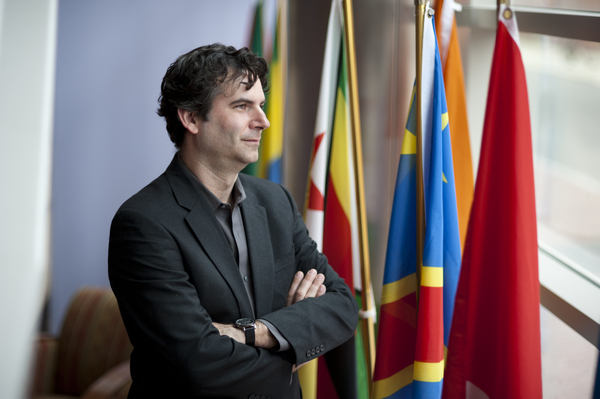Professor witnesses history in Ukraine

Last week Ukraine held its first presidential election since the violent revolution there earlier this year, and Mitchell Orenstein, professor and chair of the Department of Political Science at Northeastern, was on the ground to witness part of the historic vote.
Orenstein spent his time in the city of Lviv, located in the western part of the country. There he attended a campaign event for Petro Poroshenko, a Ukrainian billionaire who won the presidential election on May 25 with 54 percent of the vote.
“This was a personal research trip,” said Orenstein, who also traveled to Vienna, Budapest, and Switzerland. “I talked to a lot of people about politics, and it gave me a good perspective from a part of the country I have never visited before.”
After the revolution earlier this year, in which violent protests led to previous president Viktor Yanukovych’s ouster from office for his pro-Russian sentiments, Orenstein said Ukrainians are expressing an even stronger desire to align with the European Union.
“About 70 percent of the population supported pro-European Union candidates,” including Poroshenko and the presidential election runner-up, Orenstein said in an interview last week after returning from Ukraine.
Orenstein is a scholar of international politics whose research lies at the intersection of comparative politics, international political economy, and global public policy. He has closely followed the political landscape in Ukraine, delivering a campus lecture in February about the events leading up to the revolution and its impact from a geopolitical standpoint.
While in Ukraine, Orenstein witnessed other examples of the region working toward greater accessibility to the European Union. For example, he saw officials meeting in the mayor’s office to discuss ways to make it easier to travel by train between from Lviv to Krakow, Poland.
Orenstein also noted with interest that the newly elected president’s top priority was to defeat the violent separatists in small areas of the eastern part of the country, which he communicated to the people attending the Poroshenko campaign event. The president, he said, also emphasized individual responsibility.
“He didn’t promise jobs or an easier life,” Orenstein said. “He told people they need to live in a new way by breaking the culture of stealing and corruption.”
Though it was held more than 4,000 miles from the U.S., Orenstein observed that the campaign event was similar to those in the U.S., mostly because American political consultants have run the campaigns.
“There is no difference between campaigns in the U.S. and Ukraine,” Orenstein said. “I spoke with a guy from New England who was running Poroshenko’s campaign. There were big posters, video screens, music, and extensive campaign flyers.”





